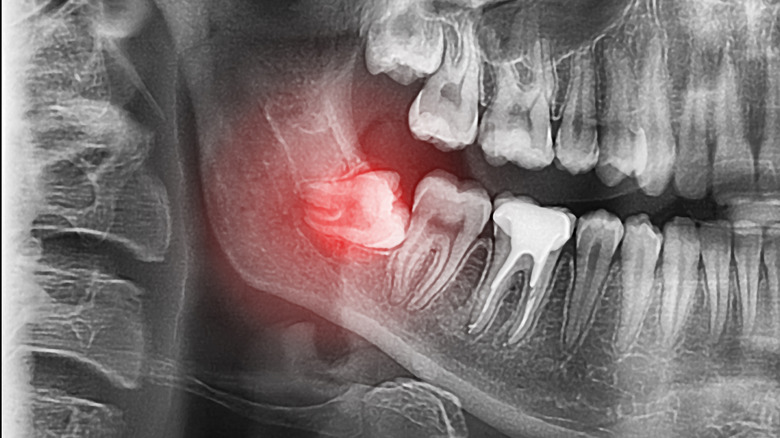Located in the rear of the mouth, our wisdom teeth generally make an appearance between the ages of 17 and 25, reports the Cleveland Clinic. Also referred to as our third molars, wisdom teeth once aided early humans in breaking down chewy meats and raw vegetables.
As is the case with any of our other pearly whites, our wisdom teeth are also susceptible to oral health issues, including cavities or dental decay (via Healthline). However, wisdom teeth, in particular, can be especially prone to infection. Swollen lymph nodes, gum inflammation, pain, swelling, fever, and bad breath are among some of the many different symptoms that can indicate a wisdom tooth infection, according to Best Dental Family & Orthodontics. Even if you’re someone who regularly brushes, flosses, and always shows up to your scheduled dental cleanings, our third molars face some unique challenges that our other teeth generally do not when it comes to infection risk.
Impacted wisdom teeth are more prone to infection

As previously mentioned, while once essential to human survival, our jaws have downsized over time and the need for wisdom teeth has progressively become obsolete (via Best Dental Family & Orthodontics). With smaller jaw sizes, many people nowadays experience overcrowding of teeth. With our third molars being among the last to arrive to the party in early adulthood, there’s not always enough room left over for them to grow in. This can lead to impaction, in which the tooth is stuck underneath our gums, unable to break through. Impaction is not uncommon, however. As per the American Association of Oral and Maxillofacial Surgeons, 90% of people in the U.S. have one or more impacted wisdom teeth.
For impacted wisdom teeth that do manage to work their way above the gum line, they often grow horizontally, at an angle, or with a portion of the gums still covering them, explains Best Dental Family and Orthodontics. This makes our wisdom teeth more difficult to get at with floss or a toothbrush. As a result, food particles, bacteria, and plaque can easily accumulate underneath the partial gum covering or in the cramped spaces between teeth if your third molars collide with a neighboring tooth. Thus, increasing the risk of infection.
Treatment methods for a wisdom tooth infection

Treatment methods for a wisdom tooth infection can vary, and some are more invasive than others. First, an in-depth cleaning of the area may be done to rid the tooth of all contaminants, explains Best Dental Family & Orthodontics. Regular use of antiseptic mouthwash may also be recommended to the patient. In some cases, however, prescription antibiotics may be warranted, such as penicillin, amoxicillin, or clindamycin, amongst others. Over-the-counter (OTC) pain-relief medications may also be used to treat discomfort from the infection.
In other cases, some degree of mild repair may be necessary to treat the infection in the form of a crown, filling, or sanding down of the tooth to create more space between the teeth and help dislodge bacteria or food particles (per Healthline). However, many people undergo wisdom teeth removal surgery altogether, such as in the event of an impacted wisdom tooth infection. However, an infection is still possible in the aftermath of the surgery for as many as two months following the procedure. Therefore, it’s important to be in contact with your dentist regarding any signs pointing to possible infection.




